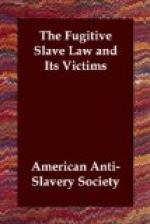slave. She was taken before the Mayor of
Covington, “who heard the case with impartiality.”
Her freedom was established, and she released.
At Indianapolis, Indiana, December, 1854, Benjamin B. Waterhouse was indicted for harboring fugitive slaves, contrary to the provisions of the Fugitive Law. He was found guilty, but the jury recommended him “to the favorable consideration of the Court, and stated that the evidence was barely sufficient to convict.” He was fined fifty dollars and to be imprisoned one hour, and the government to pay the costs.—–Chicago Tribune.
A Proposition for Kidnapping, on a large scale, was made by John H. Pope, “police officer and constable,” in a letter dated “Frederick, Maryland, United States of America, January 1, 1855,” and addressed to Mr. Hays, Sheriff of Montreal, Canada. “Vast numbers of slaves,” says Mr. Pope, “escaping from their masters or owners, succeed in reaching your Provinces, and are, therefore, without the pale of the ‘Fugitive Slave Law,’ and can only be restored by cunning, together with skill. Large rewards are offered and will be paid for their return, and could I find an efficient person to act with me, a great deal of money could be made, as I would equally divide. * * * The only apprehension we have in approaching too far into Canada is the fear of being arrested; and had I a good assistant in your city, who would induce the negroes to the frontier, I would be there to pay the cash. On your answer, I can furnish names and descriptions of negroes.”
This letter was published, doubtless at the Montreal Sheriff’s request, in the Montreal Gazette, January 13, 1855.
—> The Montreal Gazette, of February 3, published a second letter from J.H. Pope.
A warrant was issued in Boston, January 10, 1855, by United States Commissioner Charles Levi Woodbury, for the arrest of JOHN JACKSON, as a fugitive from service and labor in Georgia. Mr. Jackson, who had been for some time in the city, was nowhere to be found.
ROSETTA ARMSTEAD, a colored girl, was taken by writ of habeas corpus before Judge Jamison, at Columbus, Ohio. Rosetta formerly belonged to Ex-President John Tyler, who gave her to his daughter, the wife of Rev. Henry M. Dennison, an Episcopal clergyman of Louisville, Kentucky. Mrs. D. having deceased, Rosetta was to be sent back to Virginia in care of an infant child, both being placed in charge of a Dr. Miller, a friend of Mr. Dennison. Passing through Ohio, the above writ was obtained. Rosetta expressed her desire to remain in freedom in Ohio. The case was removed to Cincinnati, and was delayed until Mr. Dennison could arrive from Louisville. (Ohio State Journal, March 12, 1855.) The girl was set free; “but was again arrested by the United States Marshal upon the same warrant which Judge Parker had




